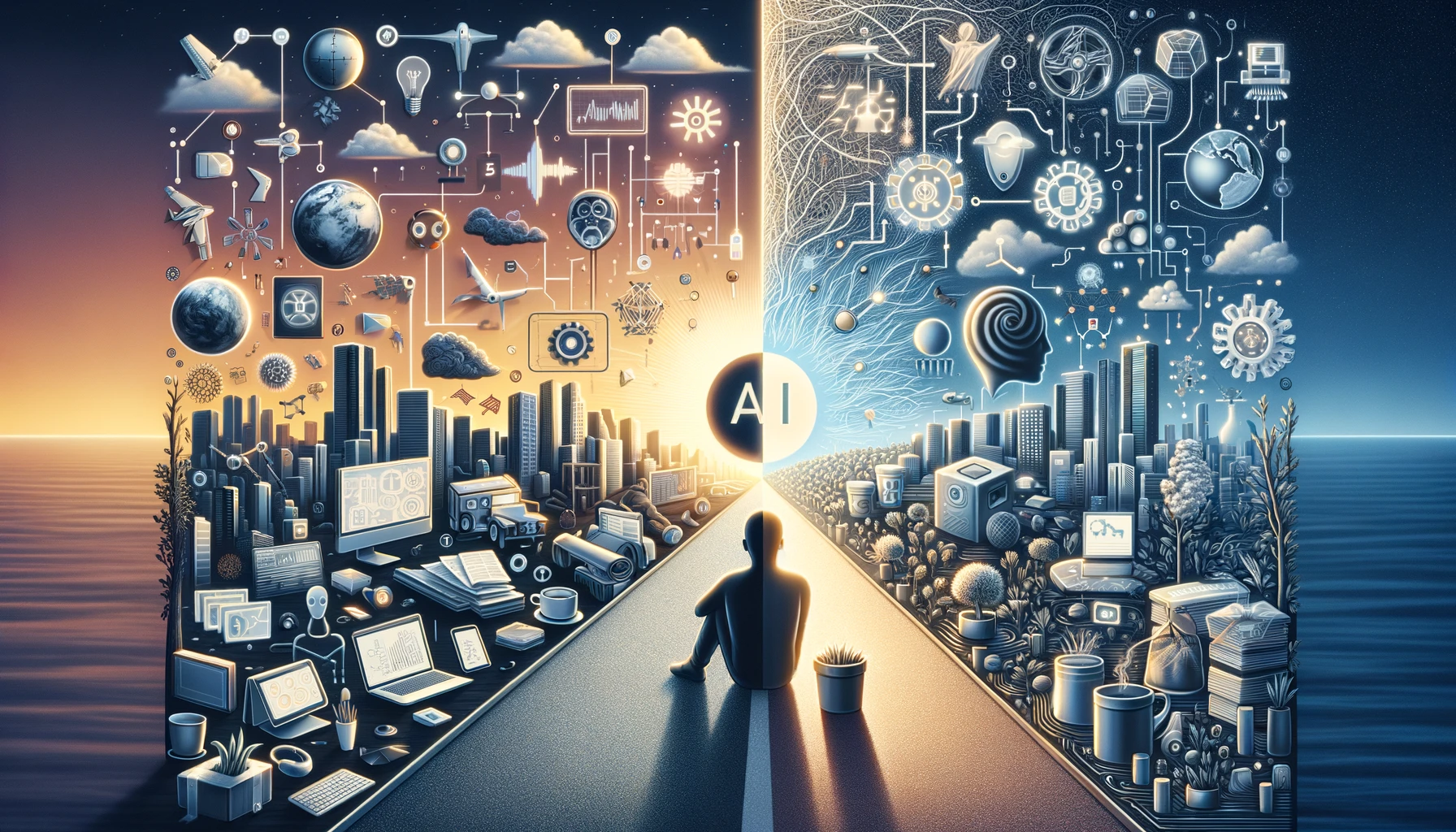In an era where technology is advancing at a breathtaking pace, it’s crucial to understand how these changes will shape our world. Among the most significant of these technological advancements is Artificial Intelligence (AI). The impact of AI on society is a topic of intense debate and speculation, and in this article, we delve into the “14 ways AI will benefit or harm society.” This exploration will not only enlighten us about the potential of AI but also alert us to the challenges we may face.
1. Revolutionizing Healthcare
AI’s application in healthcare is nothing short of revolutionary. With its ability to analyze large datasets far beyond human capability, AI is enhancing disease diagnosis, personalized medicine, and patient care.
Key Benefits:
- Improved diagnostic accuracy
- Personalized treatment plans
- Enhanced patient care and follow-up
However, concerns about data privacy and the need for human oversight in life-critical scenarios remain paramount.
2. Transforming Education
AI is set to transform education by offering personalized learning experiences and automating administrative tasks, thereby allowing educators to focus more on teaching and less on bureaucracy.
Benefits include:
- Customized learning plans based on individual student needs
- Automated grading and assessment, saving educators’ time
- Enhanced engagement through interactive AI tools
The challenge, however, lies in ensuring equitable access to these AI-enabled educational tools.
3. Advancing Environmental Protection
In environmental conservation, AI’s role is increasingly critical. It aids in climate change research, wildlife protection, and pollution control.
Impactful contributions:
- Climate modeling and prediction enhancements
- Wildlife monitoring and poaching prevention
- Efficient waste management and pollution control
The risk here is the reliance on AI algorithms which might not account for unforeseen ecological variables.
4. Shaping Employment and the Economy
AI’s influence on the job market and economy is profound. It’s creating new job categories while rendering others obsolete, thus reshaping the employment landscape.
Considerations:
- Job creation in AI and tech sectors
- Risks of job displacement in traditional sectors
- Need for re-skilling and up-skilling of the workforce
Navigating this transition to minimize the negative impact on employment is a significant challenge.
5. Enhancing Everyday Convenience
AI significantly enhances daily life, making many tasks easier and more efficient, from smart homes to personalized entertainment.
Advantages:
- Increased efficiency in home and office tasks
- Improved user experience in entertainment and shopping
- Enhanced personalization in services
However, this convenience often comes at the cost of reduced privacy and increased data collection.
6. Improving Transportation and Logistics
AI-driven advancements in transportation and logistics are revolutionizing how we move goods and ourselves, making these processes more efficient and safer.
Key areas:
- Self-driving vehicles reducing accidents and traffic jams
- Optimized logistics and supply chain management
- Enhanced public transportation systems
The challenge is ensuring these technologies are accessible to all and integrating them safely into current systems.
7. Accelerating Scientific Discovery
AI is a powerful tool in scientific research, accelerating discoveries and innovation across various fields, from astronomy to medicine.
Impacts:
- Speeding up research and development processes
- Facilitating complex data analysis
- Enabling innovative solutions to global challenges
The concern is maintaining ethical standards and human oversight in AI-driven research.
8. Influencing Governance and Public Policy
AI has the potential to transform governance by aiding in decision-making, policy development, and public service delivery.
Benefits:
- Improved efficiency in public administration
- Data-driven policy making
- Enhanced public service delivery
However, this raises questions about transparency, accountability, and potential biases in AI systems.
9. Reshaping Media and Entertainment
In media and entertainment, AI is revolutionizing content creation, distribution, and consumption, offering unprecedented personalization.
Advancements:
- Customized content recommendations
- AI-generated music, art, and literature
- Enhanced virtual and augmented reality experiences
The ethical implications of AI-created content and the potential loss of human creativity pose significant challenges.
10. Impacting National Security
AI plays a crucial role in national security, from cyber defense to intelligence analysis.
Key areas:
- Enhanced cybersecurity measures
- Improved intelligence gathering and analysis
- Autonomous defense systems
The risks involve potential escalation of cyber and autonomous warfare and ethical concerns over autonomous weapons.
11. Altering Social Interactions
AI’s impact on social interactions is profound, with social media algorithms shaping our perceptions and relationships.
Considerations:
- AI-curated social media feeds
- Virtual assistants in daily interactions
- AI in matchmaking and social platforms
The challenge is ensuring these systems promote healthy social interactions and not isolation or polarization.
12. Enhancing Accessibility for the Disabled
AI significantly contributes to improving accessibility for people with disabilities through various assistive technologies.
Key contributions:
- Speech recognition and synthesis aiding communication
- AI-powered mobility devices
- Customizable user interfaces for various disabilities
The concern lies in ensuring these technologies are inclusive and widely accessible.
13. Challenging Privacy and Security
While AI offers many benefits, it also poses significant privacy and security challenges due to its ability to process vast amounts of data.
Risks:
- Data breaches and misuse
- Surveillance and loss of privacy
- Manipulation through targeted content
Addressing these challenges requires robust ethical frameworks and stringent data protection laws.
14. Creating Ethical and Moral Dilemmas
AI introduces complex ethical and moral dilemmas, from decision-making in autonomous vehicles to biases in AI algorithms.
Dilemmas include:
- Algorithmic biases and their societal impact
- Moral responsibility in AI decision-making
- The balance between AI innovation and human values
Navigating these dilemmas requires an interdisciplinary approach and ongoing public discourse.
In conclusion, AI’s impact on society is multifaceted, offering incredible benefits while posing significant challenges. As we embrace these technological advancements, it’s crucial to remain vigilant about the ethical, social, and economic implications to ensure a future where AI contributes positively to the greater good of society.
